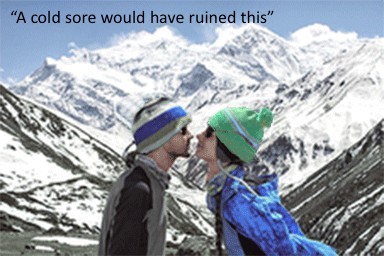How to Prevent Cold Sores

Cold sores are painful, highly contagious blisters around the mouth that can ruin your holidays. For a cold sore-free experience, our GPs recommend starting an antiviral tablet called Aciclovir 5 days before your event or trip.
Here at Dr Morton’s - the medical helpline© you can:
- talk to a GMC registered doctor
- get advice and reassurance
- buy our
Dr Morton's Prescription©for cold sores and herpes
Cold Sore Symptoms
Cold sores tend to come on in stages:
- Tingling lips or an itchy nose in the days or hours before a cold sore appears
- Painful fluid-filled blisters appear, usually where the lips join the skin. Sometimes blisters form in or on the nose, or elsewhere around the mouth
- The blisters may burst or weep and you may feel run down
- After 5 – 7 days, scabs may form as the sore heals
What causes cold sores?
Cold sores are caused by the Herpes Simplex virus. There are two strains of this virus: Herpes Simplex 1 (HSV1) is the main one that causes cold sores. Herpes Simplex 2 (HSV2) is generally responsible for genital herpes. However, on rare occasions, having oral sex with someone with genital herpes can give you a cold sore. You can also give someone genital herpes if your cold sore comes into contact with their genitals during sex.
Cold sores tend to occur in childhood first, but once you’re infected, the virus lives in the root of your nerve. When something happens to trigger the virus, it bursts out onto the surface of your skin in a painful, blistering eruption.
Triggers include:
- Stress
- Sunshine (UV light)
- Being unwell
- For women, having your period
How are cold sores diagnosed?
Usually you don’t need to have any tests to diagnose cold sores. However, in vulnerable groups, like babies or people who are immunocompromised (have a low immune system), a swab of the blister fluid can be taken, or a blood test can be done, to confirm the virus.
Are cold sores contagious?
Yes, cold sores are highly contagious. The fluid inside cold sore blisters are literally teeming with the herpes virus, so try to avoid kissing, having oral sex or anything else that might cause other people to come into contact with the fluid. Avoid picking or squeezing the blisters and always wash your hands after touching them.
Be careful when you put in your contact lenses
The virus can get into your eyes. Wash your hands thoroughly with soap and water before your put contact lenses in.
Avoid kissing babies
Keep away from very young children while you have cold sores. The herpes virus is much more serious for them, so if you have any concerns, see a doctor immediately.
Treatment and prevention of cold sores
If you suffer regularly from cold sores, you probably know exactly what your trigger factors are. They might ruin your ski trips or threaten your wedding day! However, starting an antiviral tablet called Aciclovir 5 days before your event or trip can help to prevent your cold sore from happening in the first place.
Our
Please note that Aciclovir only has a licence for herpes prevention in people whose immune systems are compromised, but it is routinely prescribed by doctors for people who are very prone to herpes breakouts under stressful circumstances or sunlight. Ask for more information if you need it.
Tips for going on holiday: use lip balm to prevent dry lips. If sunlight triggers your cold sores, a lip balm with sunscreen in it is advisable. Certain diets may help reduce the frequency of attacks. Diets rich in lysine (chicken and turkey, fish, dairy products and eggs are good sources) may help prevent an outbreak. By contrast, foods particularly rich in arginine, such as chocolate or nuts, may trigger cold sores.
Want to know more?
Related topics
- chicken pox treatment and potential complications
- syphilis, gonorrhoea, and other sexual health issues

